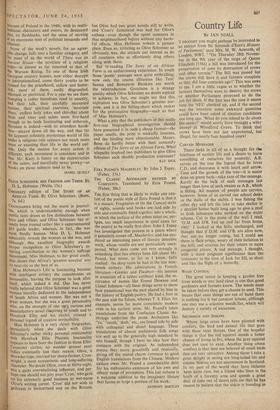OLIVE SCHREINER, HER FRIENDS AND TIMES. By D. L. Hobman.
(Watts, 15s.) CENTENARIES bring out the worst in journal- ists, which is understandable enough when Public taste draws so few distinctions between hero and villain, and Olive Schreiner has re- cently been treated rather like a superannuated girl guide leader, whereas, in fact, she was Most fluidly human. Miss D. L. Hobman admirably reveals the woman as she was, and although this excellent biography awards Proper recognition to Olive Schreiner's in- spiring contribution to the women's suffrage Movement. Miss Hobman, to her great credit. also shows that Africa's 'greatest novelist' was as neurotic as the best of us.
Miss I-lobman's Life is fascinating because With intelligent artistry she concentrates on Personality, leaving the purpose to look after itself, which indeed it did. One has never really believed that Olive Schreiner was a great woman morally dedicated to the independence of South Africa and women. She was not a great woman, but she was a great personality Who, on the strength of one veil curious and Unsatisfactory novel (ihspiring to youth and to Havelock Ellis and his circle), created a Personal legend of creative invincibility.
Miss Hobman is a very clever biographer, Particularly when she deals with Olive Schreiner's rather sticky personal relationship With Havelock Ellis. Platonic bisexuality appears to have been the fashion in those Ellis- Carpenter circles; no wonder several poor ladies eventually lost their reason. Olive, a Shrewder type, married her sheep-farmer, Cron- Wright, a most sympathetic and long-suffering Character. No doubt Olive, even at thirty-eight, was a quite overwhelming influence, and per- haps one should not pity poor'Cron.' who gave uP his extremely good business to wet-nurse Olive's writing career. 'Cron' did not wish to gallivant in Switzerland and on the Riviera.
but Olive had two great novels still to write, and 'Cron's' farmstead was bad for Olive's asthma—even though she spent summers in that neighbourhood before without any harm- ful effects. Miss Hobman reveals a picture plain. Even so, irritating as Olive Schreiner so obviously was, she attracts our interest as do all creatures who so effortlessly drag others along with them.
But re-reading The Story of an African Farm is an embarrassing experience. In youth those 'poetic' passages were quite enthralling; now only the coarse illiterates like Tant' Sannie and Bonaparte Blenkins are worth the reintroduction. Greatness is a strange quality which Olive Schreiner no doubt aspired to achieve; in fact, one might say that this, aspiration was Olive Schreiner's genuine pur- pose, and it is the falling-short which makes for the provocative biography—such as that of Miss Hobman's.
What a pity that the publishers of this really first-rate biographical investigation should have presented it in such a cheap format—the paper smells, the print is wickedly insecure, and the binding most objectionable. Messrs. Benn do hardly better with their centenaty edition of The Story of an African Farm. What' telepathy inspired two publishers to give Olive Schreiner such shoddy production treatment?
KAY DICK

















































 Previous page
Previous page